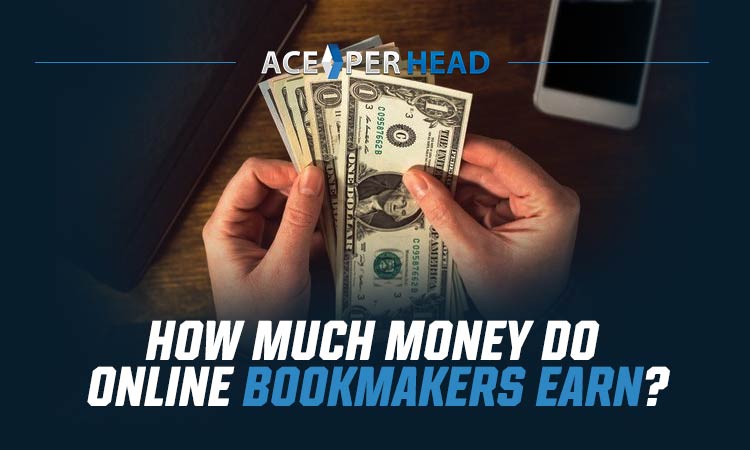
Sportsbooks. They present an opportunity for gamblers to try and make a buck but in reality, it is the bookies that shine.
In the online betting market, 40% of the action is centered around sports betting.
So, with that in mind, you would probably assume that online bookmakers have a profitable job. But, you might be wondering how those profits are determined and how much money you should expect to make if you become a sports bookmaker.
Well, this is your guide to get a better understanding of a sports bookmaker’s salary.
Pay per Head Service
This is the first factor that can go into how much a sports bookmaker should be expected to make because, with most sportsbooks, an independent sports bookie has a pay per head system.
How does it work? Pay per head means that you hire a third-party service to basically manage your sportsbook for you.
They will design your website, they will be your customer support, and most importantly, give you the tools that you need to succeed such as the right software and hardware.
A pay per head system factors into a bookmaker’s income because with this, you have to give the service a small cut for providing all of those benefits for you. Most services will only charge you around $10 per head.
What does that mean? It means that you have to pay the service $10 for every person that bets on your platform within a certain time.
For example, let’s say that you have to send a payment to a pay per head service every two weeks and about 100 people have placed a bet on your sportsbook within that time. In that scenario, you would have to send the service $1,000 as their payment.
So, depending on how many people bet on your platform, that is the amount of money that you are going to have to set aside if you choose to hire a service to help maintain and boost your sportsbook.
Wins and Losses
When it comes to the people actually betting on your sportsbook, they have a little more pressure to win bets because of the juice that you get to charge them for using your platform. You see, regular bettors have to win about 52.4% of the time just to break even.
As a sportsbook, that provides you with more flexibility to make a profit because that means that realistically, you only need to win about 47.6% of the time to break even.
Yes, you are in this for the money and you want to do better than breaking even in all likelihood. However, that is very possible, because even professional sports bettors have a hard time doing better than say 55-60%.
What does this mean? It means that you are most likely going to have a lot of bettors that are doing much worse than 52%. There might be a handful that matches that or even do better than that, but they are the exception rather than the rule.
So, if you can set your spreads and percentage of bets to an amount that reflects this, you are virtually guaranteed to make a profit.
Why? Because most bettors have to pay about a 10% juice on a typical bet or -110 odds. This means they are paying $11 to win $10 for example.
If there were 100 bets in this situation and 46 of them ended up being losses for the bettors while 54 of them won, you would still make $6 by collecting $506 and only having to pay out $500.
Money Bet
Next, you need to consider the amount of money that the bettors on your platform are betting. Maybe they are cheap bettors and only spend about $10 per bet.
Then, you could get some more high-rollers and have about $500 per bet with some people. It can depend on what area you are marketing to and what incentives you give certain bettors to use your platform versus another platform.
For instance, some sportsbooks offer a free bet when you first sign up with a certain threshold, usually a few hundred dollars. The catch is that if they win that bet, then they would have to spend whatever profits they made from that bet within the sportsbook before they could cash anything out.
In that situation, you could slowly build a loyal customer and give them an incentive to keep coming back until they inevitably bet all of that money. Then, by the time they are ready to make some bets with their own money, you already have them loyal to your platform.
You need to account for how much money particular bettors bet and how much goes to each side. Because, if you have one bettor that bets a lot of money and wins, that can wipe out any profits you might make from smaller bettors.
For example, let’s say you have one bettor that wins 60 games out of 100 betting about $110 per game. Then, you have five bettors who lose 60 games but only bet $11 per game.
In this situation, the heavier bettor is walking away with a $1,600 profit. As for the other five bettors, their losses are only $1,300 combined.
So, you need to keep an eye on bettors that affect this percentage too much to see how it would affect your profit.
Large Odds Cashing In
Sometimes, you will have a bet that you do not expect to have to pay out end up coming out. One example is the 2021 San Francisco Giants if they would have won the World Series.
This is because that even in May when they were 26-16, this team had +4000 odds to win the World Series. From the odds at that point and time, the Giants were the longest shot out of any team that ended up actually making the playoffs.
So, in response, this left sportsbooks very nervous about the Giants in the playoffs when they won the NL West. Why? Because, if they went on to win the World Series, they would have to pay off those big odds that people made earlier in the season.
Those were just the odds when the Giants started the season good too, so imagine the odds before the 2021 season even started? This can leave some sportsbooks that do not plan ahead in a very vulnerable situation if they get the odds wrong for a team that actually pulls it off.
For reference, every team that advanced to the next round had half of the odds or less than the Giants did in that article above.
This can end up being a big thing that affects your profit if a team like that unexpectedly cashes in, so you need to take that into account when thinking about how much an online bookmaker can make, especially with live odds.
The Right Lines
Jumping off of the point above, you need to offer the right lines when it comes to ensuring that you will make a profit. Given the ratio above, you want to be as close to 50/50 on the betting action for two sides of a line as possible.
So, let’s say that the Chiefs are a touchdown favorite against the Raiders in a game at home. A lot of people may feel tempted to back the Chiefs in this situation and it can be as much as 75% of bets and 75% of the handle going on the Chiefs in that situation.
Then, it comes down to your risk comfort. Ideally, you want to decrease that risk, so in that situation, you move the line up to something like -9 where it gives people that want to back the Chiefs something to think about.
Sometimes, you need to adjust the line and if you do not do this, you better be sure that you are backing the right side.
For example, there was a college football game in 2021 between Cincinnati and Notre Dame that the latter was hosting. Notre Dame is a very popular team and in the college football rankings, these two seemed evenly matched.
Yet, Cincinnati was a favorite on the road and Notre Dame was getting a large majority of the bets placed on them, ranging between 75-85% depending on the book. Yet, most books kept the line where it was and did not adjust for this.
Why? Because, the sportsbooks were confident enough that Cincinnati would win the game and cover, which they did.
So, as a bookmaker, you have to know when the time to balance is, but also when it is time to strike.
Earn Like Online Bookmakers
Online bookmakers have the potential to make a lot of money from running a sportsbook if they operate it the right way.
Are you ready to do this? Do you want professionals by your side?
Create a sportsbook and get a six-week trial for it today!




 Ace Per Head has been in the online bookmaking services business since 1998 running one of the top-rated and most trusted brands in the pay per head industry. We give our bookie agents the personalized dedicated service they deserve.
Ace Per Head has been in the online bookmaking services business since 1998 running one of the top-rated and most trusted brands in the pay per head industry. We give our bookie agents the personalized dedicated service they deserve.
